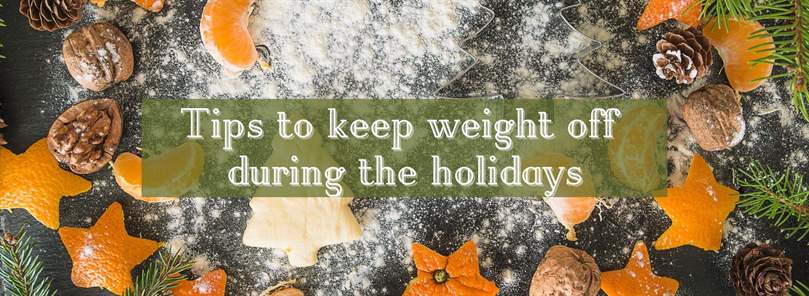Published
on
December 13, 2022
| 1,201 views
| 1 follower
members are following updates on this item.

Just like that, it is November again. Some of us are already getting the lights and trees out, writing "Happy Holidays" cards, buying presents, and planning the well-known Thanksgiving, Christmas, and Hanukkah celebrations. Maybe you are thinking you should also start saying goodbye to that summer-ready shape you worked so hard for at the beginning of the year... But it does not have to be that way! Yes, it is possible to keep weight off during the holidays, and in this article, I will give you a few tips for this endeavor.
Stay active
Physical activity has many benefits. This includes:
Moreover, physical activity has been shown to increase lifespan in many studies.

I know what you are thinking: I have so many things to do these days, how am I going to find time to exercise? Well, if going to the gym or a fitness class is too time-consuming, try to increase your daily movement. For example:
Watch out for your snacks
It is normal to arrive at a dinner party and have a table full of chips, dips, cheeses, deli meats, cookies, candy, and more. These pre-dinner snacks can be very high in calories, so you should try limiting your consumption. Save your calories for the entrees and avoid high-calorie, high-sugar treats.
.jpg?height=175&width=880)
Eat mindfully
When we have a lot of food available, we tend to overeat. Connect with your body and listen to your hunger cues. If you feel full, stop eating.
Let me give you a very simple outlook of what happens when we eat. After we consume food, our body has several processes to digest it. Then, nutrients get absorbed into our blood and travel to different places in our bodies. After our cells have taken what they need, what is left goes to our liver, which is very efficient at packing these things up and storing them in fat cells for later use. Thus, if there is no biological or energetic need at the time, a lot of the food we eat will be stored as fat. Usually, we drive back home after our dinner parties and go to sleep. As you may know, sitting in the car and sleeping are activities that demand little energy. Therefore, all the extra calories we consume will be stored as fat. There are a couple of solutions to this problem. First, if you want to eat dessert after dinner, try having a smaller portion for your main dish. Second, if you had a big portion for dinner or really enjoyed one of the foods served at dinner, just take some home and eat it the next day. Avoid eating a second plate of food or a second slice of dessert.
Eat balanced meals
This is simple, make sure that your plate has the following:

Don't drink your calories
Next time you drink soda, think about this; would you rather have a glass of soda or a piece of your favorite cake/dessert?
Sugary beverages (soda, fruit juices, sweetened iced tea and eggnog) are very high in calories and usually have significant amounts of sugar. This means that they would likely be stored as fat if you are not doing strenuous physical activity while or after consuming them.
In addition, be mindful of alcohol. Alcohol is a significant source of calories and has no other nutritional value. This is what we call an "empty calorie." Thus, excess calories coming from alcohol get quickly stored as fat.

Set yourself for success
If you know you will attend many dinner parties and places where high-calorie, high-sugar food is available, avoid buying these types of foods for your own home. Stack your fridge with fruits & vegetables and healthy snacks (aka avoid temptations).
Lastly, avoid the "I'll start tomorrow" mentality. This is an excuse to keep prolonging unhealthy habits. Set specific, measurable, attainable, and time-bound goals. For example, "I will eat vegetables with my lunch and dinner every day from December 15th to January 15th." You can even have a calendar in which you check a box each time you eat vegetables twice a day to keep track of your habits.
Bonus tip
A study published in 2018 tested the effectiveness of a brief behavioral intervention in 272 adults. They divided the participants into two groups. Group number one received information about living a healthy lifestyle. Group two received information on physical activity and caloric value from holiday treats. For example, to burn one glass of mulled wine, you will have to walk for 32 minutes, or for a slice of mince pie, you would have to run for 21 minutes. This group also received weight loss tips like the ones I mentioned in this article. In addition, group number 2 was encouraged to weigh themselves every day (or minimum 2 times a week) and record their weight and reflect on their weight changes.
The results of the study were fascinating. Group one gained weight while group two lost weight. This reinforced the idea that maintaining your routine and holding yourself accountable goes a long way.
If you want to try this approach, remember that you should weigh yourself at the same time in the morning, before you eat breakfast, with little to no clothes on and no shoes. Weighing yourself every day may seem too stressful, considering that weight fluctuates a lot due to hormonal changes, water retention, medications, etc. You can try to set up a schedule and weigh yourself twice a week, for example, Tuesdays and Fridays.
Natasha Sugimoto is a traveling Registered Dietitian who worked at Fairbanks Memorial Hospital earlier this year. In her role, she is committed to improving her patient's health, well-being, and performance. Also, she is an expert in guiding, advising, and educating patients on lifestyle choices unique to their personal needs, lifestyle, and metabolic health.
Page Options